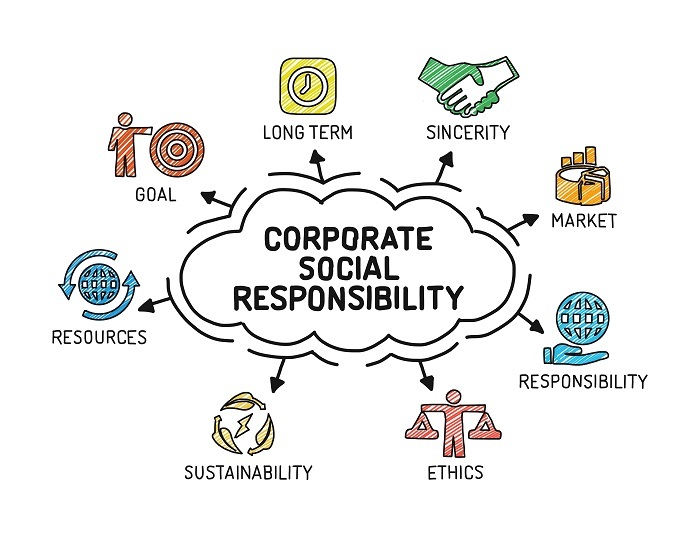
 Data Structure
Data Structure Networking
Networking RDBMS
RDBMS Operating System
Operating System Java
Java MS Excel
MS Excel iOS
iOS HTML
HTML CSS
CSS Android
Android Python
Python C Programming
C Programming C++
C++ C#
C# MongoDB
MongoDB MySQL
MySQL Javascript
Javascript PHP
PHP
- Selected Reading
- UPSC IAS Exams Notes
- Developer's Best Practices
- Questions and Answers
- Effective Resume Writing
- HR Interview Questions
- Computer Glossary
- Who is Who
Sustainability and Corporate Social Responsibility
The idea of "social responsibility" is that corporations and organizations have a duty to operate in a way that helps the community and the natural world, rather than just maximizing earnings for stockholders. Nowadays customers, workers, and financiers are more concerned than ever with moral and environmentally friendly business practices, making social accountability crucial.

Incorporating social responsibility into its operations means that an organization is dedicated to using its operations to improve society. This might involve initiatives like cutting their ecological impact, advancing equality and inclusion at work, helping out the community where they live through charitable endeavors, and using ethical and open company procedures.
Altruism is important, but social responsibility is also important. Additionally, it may help businesses in a practical way by enhancing staff participation and retention as well as company image and consumer loyalty. Businesses may gain the trust of stakeholders and establish themselves as innovators by showcasing their devotion to social responsibility.
In this situation, it is critical for businesses to think about how they affect society and the natural world in order to take action to mitigate any adverse consequences. They may contribute to building a future that is healthier for all parties involved by doing this.
Brief About Sustainability and Corporate Social Responsibility
The terms "sustainability" and "corporate social responsibility" (CSR) are interrelated because they both center on the concept that companies should operate in a manner that helps the community and the environment as well as making money for stockholders.

A firm or organization is said to be sustainable if it can fulfill the demands of today's society without jeopardizing its capacity for future generations to continue to adequately satisfy its own needs. This entails adopting a long-term stance on how businesses operate, taking into account how choices will affect the financial system, society, and the environment, and striking a balance between these considerations and the requirement to make earnings.
It is believed that firms have a duty to behave professionally and positively impact society is referred to as social responsibility for business, which is a larger idea. This might entail a variety of actions, including cutting back on greenhouse gasses, helping out the community through giving and volunteering, encouraging equality and inclusion at work, and following morally and openly commercial practices.
Though they are separate ideas, social responsibility, and environmental responsibility are closely intertwined. Firms with a focus on sustainability are also more probable to adopt socially conscious business procedures. Both ideas place a focus on the significance of having a comprehensive approach to company processes, considering the influence on everyone involved, and attempting to have a beneficial impact on society as a whole and the natural world.
Sustainability vs Corporate Social Responsibility
The following list of important distinctions between sustainability and corporate social responsibility (CSR) is organized into bullet points ?
Sustainability
Aims to make company operations more sustainable in the years to come.
Seeks to provide current demands without sacrificing the capacity of subsequent generations to fulfill their own demands.
Considers the effects on the community, the planet, and economic growth while taking a holistic approach to company activities.
Maintains the equilibrium between the desire to make a profit and concerns regarding the environment, society, and the economy.
Highlights the significance of sustainable practices, including lowering carbon dioxide emissions, protecting the earth's resources, and minimizing waste.
Corporate Social Responsibility
It aims at encouraging moral and accountable conduct in all facets of the company.
Strives to improve the community via charitable giving, volunteer work, and other societal endeavors.
Stresses the value of diversity and belonging in working environments.
Supports moral and open corporate conduct, including safeguards against corruption along with equitable labor practices.
Aims to strike the right equilibrium between the desire to make money and ecological and social issues.
While sustainability and CSR have some similar objectives, such as the value of ecological responsibility. and ethical business practices, they have different areas of emphasis and consideration.
Although CSR is mainly concerned with social effects and moral conduct, sustainability has a primary emphasis on the long-term economic viability of business activities.
Benefits of CSR
A variety of advantages may be had by corporations and organizations through corporate social responsibility (CSR). The following are a few of the primary advantages of CSR ?
Improved Brand ? Organizations may develop favorable reviews and image as companies by taking part in CSR initiatives. Customers are more inclined to endorse companies that put a high priority on corporate social responsibility (CSR) as they become more aware of issues related to the environment and society.
Better loyalty among clients ? Clients are far more inclined to remain faithful to companies that adhere to their morals and views, which may be achieved through CSR.
Staff Motivation and Interest ? When staff believes that their company is dedicated to having a beneficial influence on society and the surroundings, they are more probable to be inspired by and engaged. Staff satisfaction and retention at work may rise as a result of CSR's ability to assist foster a feeling of purpose and significance in the workplace.
Decreased Risk ? Companies that participate in CSR are considered to be trustworthy and accountable, therefore they are less likely to experience problems with their reputations. By doing so, the danger of bad press, customer backlash, and other negative impacts on reputation can be reduced.
Stronger Economic Productivity ? Although CSR does not directly affect financial results, there is research that suggests that companies that prioritize CSR do higher in the future. Businesses may develop a more environmentally conscious business model that has a greater potential for future growth by lowering risk, fostering a great reputation, and getting involved with staff and consumers.
The advantages of CSR for firms may be wide-ranging, ranging from higher brand recognition and consumer loyalty to increased staff involvement and enhanced economic outcomes. Businesses may improve both society and the surroundings while also constructing a more enduring and prosperous company model by putting a high priority on CSR.
CSR Standards and Certifications
Organizations can pursue CSR certifications and standards to show their dedication to ethical business conduct. Notable CSR criteria include:
ISO 26000 ? The internationally recognized standard offers direction on social responsibility and sustainable development, encompassing topics like community participation, preservation of the environment, labor practices, and rights for individuals.
The Global Reporting Initiative (GRI) is a structure for publishing on durability that offers instructions for addressing a variety of social, ecological, and economic challenges.
B Corporation Certification ? Companies that achieve specified criteria for social and environmental performance, transparency, and openness are given the B Corporation accreditation.
Conclusion
In conclusion, corporate social responsibility (CSR) and sustainability are both crucial ideas that entail companies and organizations accepting accountability for their effects on society as a whole and the surroundings. While CSR is more concerned with encouraging moral behavior and having a beneficial influence on society, sustainability is more concerned with the future sustainability of corporate operations and attempts to balance social, economic, and environmental problems. Firms may improve their brand, connect employees and clients, lower risk, and develop a more effective and durable company structure by putting corporate social responsibility (CSR) and sustainability first.

